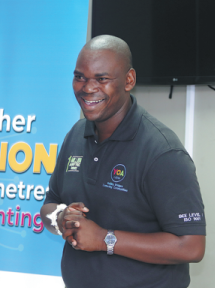International outlook of BRI helping businesses in Wuhan grow overseas

Enterprises in Wuhan city, Central China's Hubei province, are expanding toward global markets under the Belt and Road Initiative, cultivating a large number of professionals and boosting local economic and social development.
Eight years ago, YOFC, a Wuhan-based enterprise specializing in the production and sale of fiber-optics and cables, set up Yangtze Optics Africa Cable, or YOA Cable, in Durban, South Africa.
Velile Mngonyama, a local production manager of YOA Cable, recalled that to start production smoothly, he and seven other colleagues, as the first group of foreign technical personnel, went to Wuhan in August 2016. There they completed a full set of training, from fiber-optic technology and equipment maintenance to production management, within a month.
"When joining YOA Cable, I started from scratch, and it was the Chinese engineers at YOFC who patiently taught me how to use equipment and manage the production," he said.
Today, YOFC has established eight production bases in countries involved in the BRI, with more than 50 overseas offices, serving more than 100 countries and regions.
In Manila, the capital of the Philippines, a steaming bowl of hot dry noodles has become a regular on the table of Rayan Nalua, senior technical manager of the Philippine subsidiary of Wuhan Fiber-Home International Technologies.
When he first joined the company 10 years ago, Nalua was a local technical engineer in the network operations and maintenance team. "At that time, my Chinese leaders and colleagues were very tolerant and gave me many opportunities," he said.
Expanding to major cities such as Manila, Cebu and Davao, Fiber-Home Philippines has become an industry leader with more than 15,000 employees and launched projects across the country.
Ivo, a Bulgarian employee of Wuhan-based HGTECH, an industrial tech enterprise producing laser equipment, said: "China develops rapidly, and the company innovates quickly as well. I enjoy this competitive atmosphere and want to do better."
In 2012, he came to study mechanical engineering at Huazhong University of Science and Technology and graduated with a master's degree in 2018. At the time, HGTECH was expanding into the European market and recruiting talents from home and abroad.
At HGTECH, new self-developed products are emerging continuously. Initially unfamiliar with these products, Ivo took the initiative to search for information to understand the uses, performance, and advantages of the products, and how to provide solutions when issues arise.
Soon after, Ivo secured his first order in Bulgaria, also HGTECH's first in the country. "Working in a high-level company requires continuous learning of new knowledge and mastering new skills," Ivo said.
In Addis Ababa, the capital of Ethiopia, Demeke Lule of Humanwell Pharmaceutical Ethiopia, a subsidiary of Wuhan-based Humanwell Healthcare, talked about his achievements over the past few years.
"The pharmaceutical industry is a high-tech industry, and I want to learn advanced pharmaceutical knowledge to produce high-quality drugs urgently needed by Africans," Lule said. From equipment names to specific uses, from machine buttons to operating procedures, under the guidance of Chinese masters, he learned step-bystep.
In 2019, Lule became the quality department's instruments head and was appointed as the executive manager of the quality department in 2022, responsible for process management, equipment maintenance, and training new employees.
Meanwhile, 36-year-old Kristian Kumpumaki, a Swedish language specialist at Transn, an internet-based language services provider in Wuhan, said he hopes to bridge the gap of cultural exchange and mutual learning, allowing the world to understand the real China.
In 2008, filled with curiosity and a longing for Chinese culture, he came to China. "I knew some information about China from the internet and news, and I really wanted to see what the real China was like."
He first took a semester of Chinese language classes at the University of International Business and Economics. After completing his studies, he moved to Shenzhen, Guangdong province, to work and continue studying Chinese.
"The BRI is a great thing for a translator and this gives me great opportunities. It impacts my work life in a very positive way," he said.
In 2023, Wuhan had a total of 79 enterprises engaging in direct investments in 26 countries and regions.
wangjinhui@chinadaily.com.cn



















